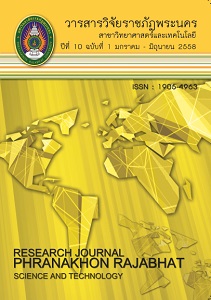ผลของการใช้โปรแกรมสุขศึกษาเพื่อการส่งเสริมพฤติกรรมการป้องกัน โรคพยาธิใบไม้ตับของประชาชนกลุ่มเสี่ยง ชุมชนบ้านเหล่าอ้อย หมู่ที่ 5 ตำบลหนองสังข์ อำเภออรัญประเทศ จังหวัดสระแก้ว
Keywords:
โรคพยาธิใบไม้ตับ, โปรแกรมสุขศึกษา, Opisthorchis viverrini, Health Education ProgramAbstract
การวิจัยครั้งนี้ เป็นการวิจัยกึ่งทดลอง แบบกลุ่มเดียว มีวัตถุประสงค์เพื่อศึกษาผลของ โปรแกรมสุขศึกษาเพื่อการส่งเสริมพฤติกรรม การป้องกันโรคพยาธิใบไม้ตับ กลุ่มตัวอย่าง ได้จากการเลือกแบบเจาะจง เป็นประชาชน กลุ่มเสี่ยง ชุมชนบ้านเหล่าอ้อย หมู่ที่ 5 จำนวน 48 คน เครื่องมือที่ใช้ในการเก็บรวบรวมข้อมูล ได้แก่ แบบทดสอบความรู้เกี่ยวกับการป้องกัน โรคพยาธิใบไม้ตับ แบบสอบถามทัศนคติเกี่ยวกับ การป้องกันโรคพยาธิใบไม้ตับ และแบบสอบถาม พฤติกรรมเกี่ยวกับการป้องกันโรคพยาธิใบไม้ตับ โปรแกรมสุขศึกษาเพื่อการส่งเสริมพฤติกรรม การป้องกันโรคพยาธิใบไม้ตับประกอบด้วย กิจกรรมที่ประยุกต์ใช้ทฤษฎีแบบแผนความเชื่อ ด้านสุขภาพ ทฤษฎีแรงจูงใจเพื่อการป้องกันโรค และทฤษฎีแรงสนับสนุนทางสังคม สถิติที่ใช้ ในการวิเคราะห์ข้อมูล ได้แก่ ร้อยละ ค่าเฉลี่ย ส่วนเบี่ยงเบนมาตรฐาน และ Paired t - test
ผลการศึกษาพบว่า ภายหลังการเข้าร่วม โปรแกรมสุขศึกษาเพื่อการส่งเสริมพฤติกรรม ป้องกันโรคพยาธิใบไม้ตับ ประชาชนกลุ่มเสี่ยง มีความรู้เกี่ยวกับพฤติกรรมการป้องกันโรค พยาธิใบไม้ตับ (ค่าเฉลี่ย 13.44) มีทัศนคติ เกี่ยวกับพฤติกรรมการป้องกันโรคพยาธิใบไม้ตับ (ค่าเฉลี่ย 4.36) และพฤติกรรมเกี่ยวกับการ ป้องกันโรคพยาธิใบไม้ตับ ในด้านการปฏิบัติตน (ค่าเฉลี่ย 3.80) และการบริโภคอาหาร (ค่าเฉลี่ย 1.77) ดีกว่าก่อนเข้าร่วมโปรแกรมสุขศึกษา เพื่อการส่งเสริมพฤติกรรมการป้องกันโรคพยาธิ ใบไม้ตับ อย่างมีนัยสำคัญทางสถิติที่ระดับ .05
ผลการศึกษานี้แสดงให้เห็นว่า โปรแกรม สุขศึกษาเพื่อการส่งเสริมพฤติกรรมการป้องกัน โรคพยาธิใบไม้ตับ เหมาะสำหรับการส่งเสริม พฤติกรรมการป้องกันโรคพยาธิใบไม้ตับของ ประชาชนกลุ่มเสี่ยง ในพื้นที่ ชุมชนบ้านเหล่าอ้อย หมู่ที่ 5 ตำบลหนองสังข์ อำเภออรัญประเทศ จังหวัดสระแก้ว
RESULTS OF HEALTH PROGRAM TO IMPROVE QUALITY OF LIFE AND PREVENT O. VIVERRINI LIVER INFECTION IN THE LOCAL POPULATION OF BAN LAOAOI VILLAGE, MOO 5, NONG-SANG SUB-DISTRICT, ARANYAPRATHET DISTRICT, SAKAEO PROVINCE.
The objective of this study was to investigate theeffects ofa health education program that promoted liver fluke disease prevention behaviors. The research type used was single group with a quasi-experimental design. Sample subjects were taken from a population of susceptible people in Ban LaoOi Village, Moo.5. totaling 48 people, The instrument used for data collection was a knowledge test about the liver fluke disease, studying attitudes about the prevention of liver fluke disease, and a behavior questionnaire about the prevention of liver fluke disease.This health education program included an activity involving belief in scientific health theory, an activity involving theoretical motivation for the prevention of the disease and theories of social support. The statistics used in data analysis included percentage, mean, standard deviation, and paired t-test.
The results showed that after joined health program for promotion and prevention of liver fluke disease, the at-risk population group knew about liver fluke disease (with an average score 13.44), showed proper attitudes about preventive behaviors (with an average score of 4.36), practiced preventive behaviors (with an average score of 3.80),and consumed more food (with an average score of 1.77), which was higher than before joining the health program to promote prevention of liver fluke disease. All results were statistically significant at the .05 level.
This study shows that the health program to promote prevention of liver fluke disease worked to reduce fluke disease in the at-risk population group in Ban Lao-Oi village Moo. 5, T. Nongsang, A. Aranyaprathet, Sakaew
Downloads
Issue
Section
License
โปรดกรอกเอกสารและลงนาม "หนังสือรับรองให้ตีพิมพ์บทความในวารสารวิจัยมหาวิทยาลัยราชภัฏพระนคร สาขาวิทยาศาสตร์และเทคโนโลยี" ก่อนการตีพิมพ์




